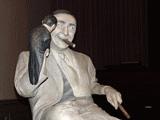AVIVA-Berlin >
Women + Work > WorldWideWomen
AVIVA-BERLIN.de im Februar 2026 -
Beitrag vom 20.04.2007

It feels like coming home
Clarissa Lempp
Nicola Lubitsch is the only daughter of the film director Ernst Lubitsch. At the Lubitsch-Festival 2007 in Berlin she was the guest of honour and spoke with AVIVA about her life and famous father
Co-authoress and photos: Daniela Besser
Nicola Lubitsch was born in 1938 in Los Angeles and is the daughter of Ernst Lubitsch and Vivian Gaye. She worked as an actress on Broadway and later produced and presented classical music on the radio. She came to the Lubitsch-Festival in Berlin to watch the German films of her father and to follow the roots of her family.
AVIVA-Berlin: What are your feelings when you are watching the German films of your father?
Nicola Lubitsch: I wish I knew more about it and I was more involved. My father's German fans have to inform me about his country and about his work in this country. For me it's remarkable. I'm American and I can't know everything about it, but it's just amazing. I think the German films had such an incredible sense of pattern, beauty and elegance. If you look at the Oyster Princess, it's just designed and there are things that must have been revolutionary: on the three screens you see them upstairs, downstairs and you see the dance too. I think the dancing scene is amazing. It's a beautifully choreographed dance.
AVIVA-Berlin: What do you think when you see your father acting in these early films?
Nicola Lubitsch: I look at him and I try to see what he looked likeãÎ you know, my mother said that I have the same head and my hands are like his. But I try to see his expression. My children have something of him. It's very emotional to see him. And especially when I first saw him. I watched the films with my youngest daughter and they were almost about the same age. Which was so weird because you always see your father as an old person. Now I am older then he was.
AVIVA-Berlin: Your father died when you were nine years old. How do you remember the private side of your father? Is there something about him that you never will forget?
Nicola Lubitsch: He was a strict father but not in a kind of overwhelming nasty way. He was a very loving, intimate person and he always had time for me. He made me feel very loved, very special. He spoiled me. (Laughs) 
He didn't say 'no' too often except he didn't let me get a horse or dog. But I had a cat. And he hated cats. He was very strict with the things you had to do and the way you had to behave. He was very outgoing with people and if he had people to the house, he would have my nurse bring me down in a dressing gown. I was persuaded to sit down and talk to people or sit down and play the piano. Or he brought me on the set and I had to play the piano. I just hated that and I didn't want to do it. That upset him. He didn't understand it. He didn't understand something other then his own focus. For him, playing the piano was an extension of himself and something he could do all the time. So he couldn't understand see that his daughter didn't feel comfortable doing that. He didn't see the fact that I was shy.
AVIVA-Berlin: Your father was Jewish, but not religious. He was rooted in Berlin and German by birth. After he was denationalized in 1935, he became an American citizen. How did he deal with the different cultures?
Nicola Lubitsch: I was a little girl but I remember at Christmas we had a "Baumkuchen". He ate an "Aufschnitt" for lunch and a lot of "Leberwurst" and that kind of bread. That was the most German thing. After the war everybody in the house was German but he stopped everybody from speaking German. My mother also spoke German. I don't know if they spoke German when they went out with friends. Every Sunday we went to an acquaintance's house and I think most of the people there were German but I don't remember if they spoke German.
AVIVA-Berlin: What about Jewish influences?
Nicola Lubitsch: Zero. I had none at all.
AVIVA-Berlin: Lubitsch immigrated in America 1922. How did he feel about relatives, friends and colleagues who remained in Germany in the time of Nazi terror?
Nicola Lubitsch: Would you tell an eight-year-old girl? First of all my parents were divorced and I spent only half of the year with my father. He worked all the time. So I think sitting down with your little daughter you wouldn't be talking about the Nazis. He never came back to Germany and he was lucky to have all of his family alive, except for my uncle's wife who was not Jewish. She was Dutch. My father never talked about his past. So I can't answer that. His cousin, she had lived with my father, told me everything about my father and about my grandfather. My grandfather just adored him and he spoiled him and everything my father wanted it was given to him. With the other children my grandfather was not so tolerant, so it's amazing that my father's brother and sisters didn't hate him because all the attention was focused on him.
AVIVA-Berlin: You worked as an actress, and you also produced music. Did Lubitsch the artist influence your work?
Nicola Lubitsch: I thought about it. I wanted to be an actress but I didn't have the personality. It was on a time when everybody was blonde and blue eyed and they all looked like Sandra Dee. Acting would come later for me, but first I went to the radio.
AVIVA-Berlin: Lubitsch always pays attention to the topics of love and passion. Were these topics personal subjects or the theme of that time?
Nicola Lubitsch: When I think about how he loved women and how he always had strong womenãÎand it hasn't dated: there are the same sentiments, the same problems in relationships, and the same issues of women's right. It's today's issues that women deal with, they are right there. There is no really sort of shy shrinking violet.
AVIVA-Berlin Do you have a special relation to Berlin? What do you like to see or visit while you are in the city?
Nicola Lubitsch: I feel like it's coming home. I think this is my fourth time and I wish I could speak German. I feel like I'm missing a lot, because I don't. There is a lot of energy and life in Berlin. And it's so exciting. I've always loved Germany. I coming to see the films because it is my chance to see them and we don't get that chance to often. I have DVDs but it's not the same.
AVIVA-Berlin: Thank you!
(Thanks for assistance in translation to Jennifer Gallagher)